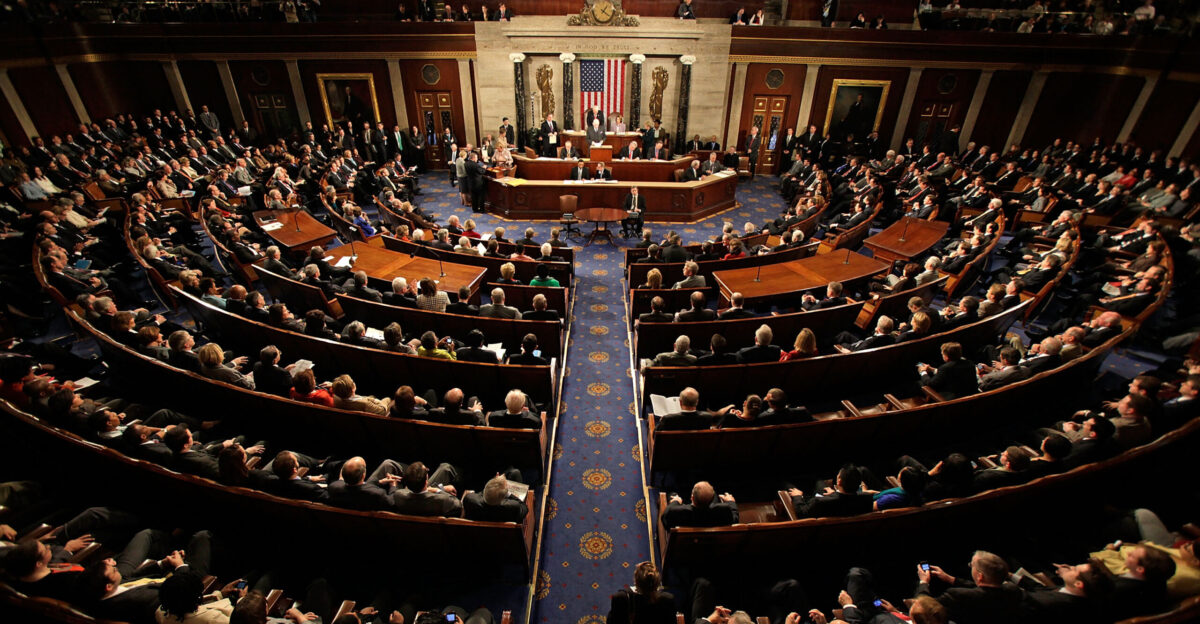Trio of Republicans Vote Against Anti-Lynching Bill That Passes 422-3

Chip Somodevilla/Getty Images
Three House Republicans voted against an anti-lynching bill on Monday, which passed overwhelmingly, 422-3.
H.R. 55, an amendment to section 249 of the U.S. code, also called the “Emmett Till Antilynching Act,” was put up for a vote on Monday.
The act is named after Emmett Till, a 14-year-old Black teenager who was mutilated and shot to death in Mississippi in 1955 after he was accused of offending a White woman.
The act calls for up to 30 years in federal prison perpetrates whose actions cause “death or serious bodily injury” resulting from an offense identified as a lynching.
The amendment passed, as 221 Democratic votes and 201 Republican voted in favor. Seven Republicans and one Democrat did not vote, while three Republicans voted nay.
Those who voted against the amendment were Reps. Andrew Clyde (R-GA), Thomas Massie (R-KY) and Chip Roy (R-TX).
Clyde did not offer comment regarding why he voted no on the amendment.
Roy released the following statement:
Lynching is an unspeakably heinous crime. But This bill doesn’t have anything to do with lynching, other than its name.
It does not make lynching a federal offense. In fact it creates no new federal offenses. It simply raises the punishment for things that are already federal crimes, including those that are unrelated to lynching — such as gender identity — in an effort to advance a woke agenda under the guise of correcting racial injustice.
Congress and the media should be honest with the American people about what bills do and don’t do. As much as I favor harsher penalties for violent offenders, this is a matter for the states and I will not vote for legislative deception. I will also not support enhancing the power of a federal government that so often abuses it.
Massie, a libertarian-leaning Republican, explained his no vote on Twitter Monday evening. He said making lynching a federal crime is unconstitutional.
“The Constitution specifies only a handful of federal crimes, and leaves the rest to individual states to prosecute,” Massie wrote.
Here are the reasons I voted NO on the Anti-lynching Act last Congress and why I voted NO tonight:
(1) The Constitution specifies only a handful of federal crimes, and leaves the rest to individual states to prosecute.
— Thomas Massie (@RepThomasMassie) March 1, 2022
Massie also opined that the amendment has the potential to broaden the power of the federal government for crimes which are already illegal.
(2) This bill expands current federal “hate crime” laws. A crime is a crime, and all victims deserve equal justice. Adding enhanced penalties for “hate” tends to endanger other liberties such as freedom of speech.
— Thomas Massie (@RepThomasMassie) March 1, 2022
(4) The bill creates another federal crime of “conspiracy,” which I’m concerned could be enforced overbroadly on people who are not perpetrators of a crime.
— Thomas Massie (@RepThomasMassie) March 1, 2022
Speaker Nancy Pelosi (D-CA) called on the Senate to “take immediate action and send this bill to the President’s desk.”
UPDATE: This story has been updated to include a comment from congressman Roy.
New: The Mediaite One-Sheet "Newsletter of Newsletters"
Your daily summary and analysis of what the many, many media newsletters are saying and reporting. Subscribe now!






Comments
↓ Scroll down for comments ↓